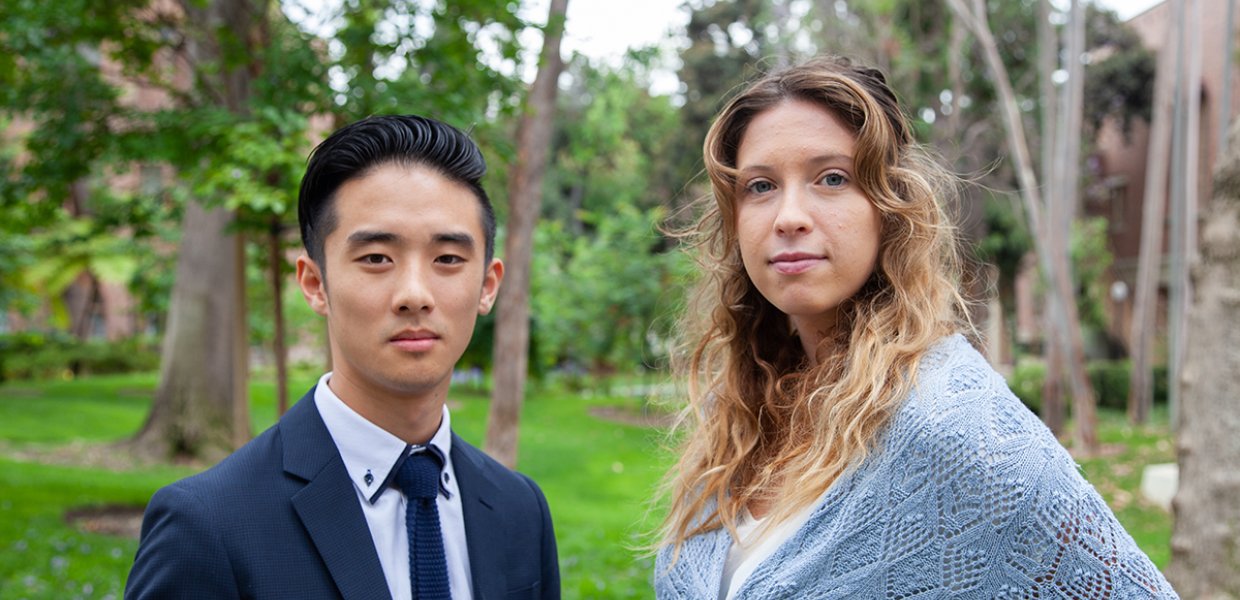After World War II, when the Japanese American community returned to Los Angeles after having been forced into internment camps, St. Mary’s Episcopal Church in Koreatown opened its doors to those who had nowhere else to go. Now, thanks to some committed Trojans, the church is once again opening its doors — this time for college students who don’t have a place to sleep at night.
The idea was born out of a public policy course on nonprofits offered by the USC Price School. During one class, guest speaker Louis Tse, co-founder of Bruin Shelter, told the students about the nine-bed shelter his group opened near UCLA in 2016. While St. Mary’s was originally proposed as a site for Bruin Shelter, Tse noted, it was too far away for to serve students on L.A.’s westside.
Recognizing the same need exists at USC and that St. Mary’s would be an ideal site, two students in the Price class — Abigail Leung, a senior majoring in public policy at USC Price, and Esther Cha, a junior majoring in business at USC Marshall — quickly seized the opportunity and co-founded Trojan Shelter in Fall of 2018.
Their first step was to establish an executive board to help move the effort forward. USC Annenberg communication major Matthew Lee ’20, who was a fellow classmate of Leung and Cha’s in the course, joined the eight-person board. Emma Dessau ’20, also a communication major, was hired on as well. Lee serves as director of media and Dessau as director of grants and advocacy.
Lee and Dessau pointed to a recent California State University study, which found that a little more than 10 percent of college students experienced homelessness. For the community college population, 55 percent of students surveyed experienced some form of housing insecurity, with close to 20 percent having experienced homelessness in the past year.
Lee had initially delved into the issue of homelessness while working on USC Annenberg Media’s South L.A. desk. As he covered stories around the implications of gentrification, he started asking, “Why isn’t anybody doing anything about this?” For Lee, being part of Trojan Shelter was his way to help bring about change.
Lee also began to acquire the skill set he needed to help raise the attention for the project through the “Designing Media for Social Change” course he took with Clinical Professor of Communication Alison Trope and Professor of Communication Sarah Banet-Weiser.
“Our class looked at how communication tactics can shift the mindsets of audiences on social issues, which has been very helpful to draw on as I produce media for Trojan Shelter,” he said.
Dessau has also found her coursework at USC Annenberg invaluable as she seeks to advance support for Trojan Shelter.
“I think a big part of what I’m learning is how to unpack and create stories that allow me to explain this massive issue that is happening nationwide in a concise way,” she said. “It has truly been an amazing experience to be part of making a tangible impact for my peers at USC and throughout Los Angeles.”
The space at the church opens early November and will be serving six housing-insecure college students from across Los Angeles, ages 18-25, who are enrolled in at least 2 units for a whole school year. Students do not need to be enrolled at USC. The organization Students4Students will be working with the executive team at Trojan Shelter to help find and screen the candidates.
Trojan Shelter is looking for people to work with them on this mission. Interested volunteers will be trained to assist with overnight duties, crisis response, cooking, community building, and more. They are also looking at ways to make the church space “a home” and are taking donations for furniture, kitchenware, toiletries, non-perishable foods, blankets and school supplies.
“People are surprised that this is an issue,” Dessau said. “Not only do we hope to raise awareness and support for the students experiencing insecurity around housing, but also for the issue at large.”
USC Annenberg students experiencing housing insecurity are eligible to apply for emergency aid.
